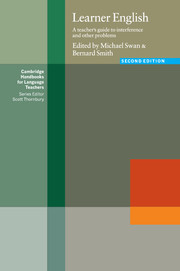Book contents
- Frontmatter
- Contents
- Notes on contributors
- Introduction
- Note for teachers of American English
- List of phonetic symbols
- Acknowledgements
- Dutch speakers
- Speakers of Scandinavian languages
- German speakers
- French speakers
- Italian speakers
- Speakers of Spanish and Catalan
- Portuguese speakers
- Greek speakers
- Russian speakers
- Polish speakers
- Farsi speakers
- Arabic speakers
- Turkish speakers
- Speakers of South Asian languages
- Speakers of Dravidian languages
- Speakers of West African languages
- Swahili speakers
- Malay/Indonesian speakers
- Japanese speakers
- Chinese speakers
- Korean speakers
- Thai speakers
- The cassette and CD
The cassette and CD
- Frontmatter
- Contents
- Notes on contributors
- Introduction
- Note for teachers of American English
- List of phonetic symbols
- Acknowledgements
- Dutch speakers
- Speakers of Scandinavian languages
- German speakers
- French speakers
- Italian speakers
- Speakers of Spanish and Catalan
- Portuguese speakers
- Greek speakers
- Russian speakers
- Polish speakers
- Farsi speakers
- Arabic speakers
- Turkish speakers
- Speakers of South Asian languages
- Speakers of Dravidian languages
- Speakers of West African languages
- Swahili speakers
- Malay/Indonesian speakers
- Japanese speakers
- Chinese speakers
- Korean speakers
- Thai speakers
- The cassette and CD
Summary
On the accompanying cassette and CD, speakers of the various languages referred to in the book were recorded:
reading the introduction to the story shown in the picture strip below;
continuing this story in their own words;
reading aloud the shopping list which follows;
giving brief details of their nationality, place of birth and first language.
In this way they produced samples of controlled and semi-controlled speech, in which common characteristic phonological and syntactic difficulties may be exemplified. The reading texts are briefly annotated to indicate areas of difficulty some speakers may have.
The interviews are in the order of the chapters but, for the benefit of those readers who enjoy a challenge, the nationality and first language of the speakers are not revealed until their closing remarks.
The introduction to the picture story
My uncle, John Smith, has a very good job. He's a university professor, actually, and very intelligent. But the strange thing is, he's always losing things. It's quite extraordinary. Last Thursday, for example, during a trip to London on business, he accidentally left his umbrella on the train. It must be the sixth time he's lost that same umbrella. It's a rather special one, with red and yellow stripes, a present from his youngest daughter for his birthday one year. Anyway, the next day, as soon as he was free, he called at the Lost Property Office to ask about it. Fortunately, it's in the next street to his house.
Information
- Type
- Chapter
- Information
- Learner EnglishA Teacher's Guide to Interference and Other Problems, pp. 357 - 362Publisher: Cambridge University PressPrint publication year: 2001
